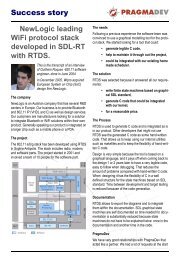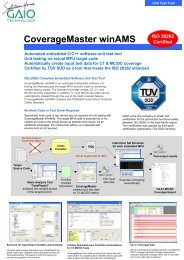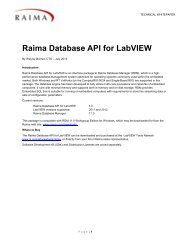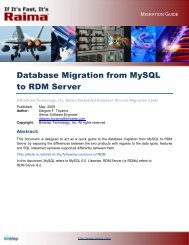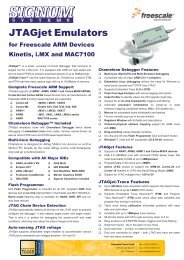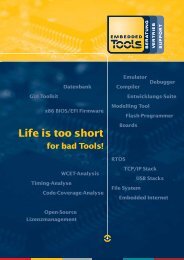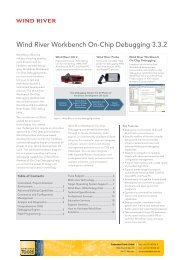Wind River Diab Compiler Release Notes, 5.9.2 - Embedded Tools ...
Wind River Diab Compiler Release Notes, 5.9.2 - Embedded Tools ...
Wind River Diab Compiler Release Notes, 5.9.2 - Embedded Tools ...
You also want an ePaper? Increase the reach of your titles
YUMPU automatically turns print PDFs into web optimized ePapers that Google loves.
6. Documentation Errata■■■■■__diab_memset(a, 0, 128*128*sizeof(a[0][0])).Use -Xno-builtin to disable this kind of transformation.-Xbss-zero-init-const-on. Move const variables initialized to zero to BSS.-Xbss-zero-init-const-off. Do not move const variables initialized to zero toBSS.-Xdisable-intrinsic-mask. Disable specific intrinsic functions.-Xkeep-function-asm. Generate function body if it contains an assemblystring or calls an assembly macro.Normally, static functions that are not called and do not have their addresstaken are deleted by the optimizer. This option prohibits that action for anyfunction that has an assembly string or that “calls” an assembly macro in itsbody.-Xsmall-data-registers and -Xsmall-const-registers. Use these options tosupport the automatic extension of small data and small constant areas tomore than one register on targets that support this feature.-Xsmall-data-registers=n-Xsmall-const-registers=mTargets that support small data and small constant areas have a register that isis reserved by the ABI to support referencing small variables and smallconstants using base-register-plus-offset addressing modes. This can providegreater efficiency and smaller code size. In some cases, these areas may not bebig enough to hold all of the application's data, which requires the user to takesome sort of action to resolve the problem. One solution is to manually placesome variables in different sections, and to reserve a register globally acrossthe application, thus reducing the number of variables in the small areas to fitthe size limitations.The -Xsmall-data-registers=n and -Xsmall-const-registers=m options tell thecompiler and the rest of the toolchain to automatically extend the number ofregisters reserved to n and m, respectively (where n and m would be greaterthan 1). For example, at link time the small constant area may overflow, andthe user may decide to use two registers to fix the problem by specifying-Xsmall-const-registers=2. Once the entire application is recompiled with thisoption, the linker can link the application correctly and safely. Note, however,that by reserving more registers, fewer variables are free for use and this couldhave a negative impact on performance and size.The use of these options changes the effective ABI of the target. Because thishappens automatically (and by intention) to simplify the process for the user,the user does not control which variables are referenced by which registers.Any variable placed in the small data and small constant areas may beaccessed through the original ABI register pair, or by other registers, as part ofan implied special ABI extension.To make sure that the registers that are re-purposed as extended small arearegisters are not arbitrarily used for multiple purposes by the compiler, youmust build the entire application—including library code— with the same-Xsmall-data-registers=n and -Xsmall-const-registers=m settings. The linkergenerates warnings (by default) when the ABIs of the object files areinconsistent and ignoring these warnings may result in applications13





